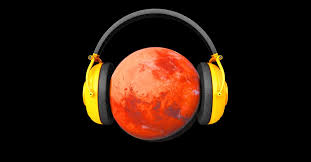
What's is the Loudest Planet in the Solar System?
Share
Greetings.
WE've been prodded yet again to drop nuggets of gold.
It's time for, Ask ARSE!
"hi folks, its jamie. I was wondering with the blog you had about the atmosphere on each planet which is the loudest? Heaps of the planets look so extreme, but does that make it louder than earth's cities and factories etc?"
You might think it's Earth, because we have so much noise pollution from cars, planes, factories, and people.
But you would be wrong.
Earth is actually pretty quiet compared to some other planets. The loudest planet in the solar system is actually Jupiter. That's right, the big gas giant that is more than 20 times more massive than Earth.
Why so loud?
Well, it's not because of its atmosphere or its weather. It's because of its radio emissions.
Radio emissions are electromagnetic waves that can travel through space and can be detected by radio telescopes.
Jupiter emits a lot of radio waves because it has a powerful magnetic field that interacts with charged particles from the sun and its moons.

These interactions create a lot of noise that can be heard by radio telescopes on Earth and in space.
Jupiter's loudness will depend on how and what you use to measure it.
If you use the decibel scale, which is how we measure sound on Earth, Jupiter would be about 1000 decibels. That's way louder than anything we can hear on Earth.
The loudest sound ever recorded on Earth was a volcanic eruption in 1883 that was about 180 decibels.
Anything above 194 decibels would create a shock wave that would destroy everything in its path.
Decibels are not really a good way to measure sound in space.
There is no air or medium for sound waves to travel through. A better way to measure sound in space is by using power flux density, which is how much energy per unit area per unit time is carried by a wave.
Power flux density is measured in watts per square meter (W/m^2). The higher the power flux density, the louder the sound.
Using this measure, Jupiter has a power flux density of about 10^14 W/m^2 at a distance of one astronomical unit (AU), which is the average distance between Earth and the sun.
That's equivalent to about 10^8 W/m^2 per hertz of bandwidth, which means how much power per unit frequency is carried by a wave. That's a lot of power and a lot of noise.
To put it in perspective, the sun has a power flux density of about 10^3 W/m^2 at one AU, which is about 10^-3 W/m^2 per hertz of bandwidth.
That means Jupiter is about 10^11 times louder than the sun at radio frequencies. That's crazy loud.
So, Jupiter is the loudest planet in the solar system by far. If you could hear it with your ears, it would blow your mind (and your eardrums).




